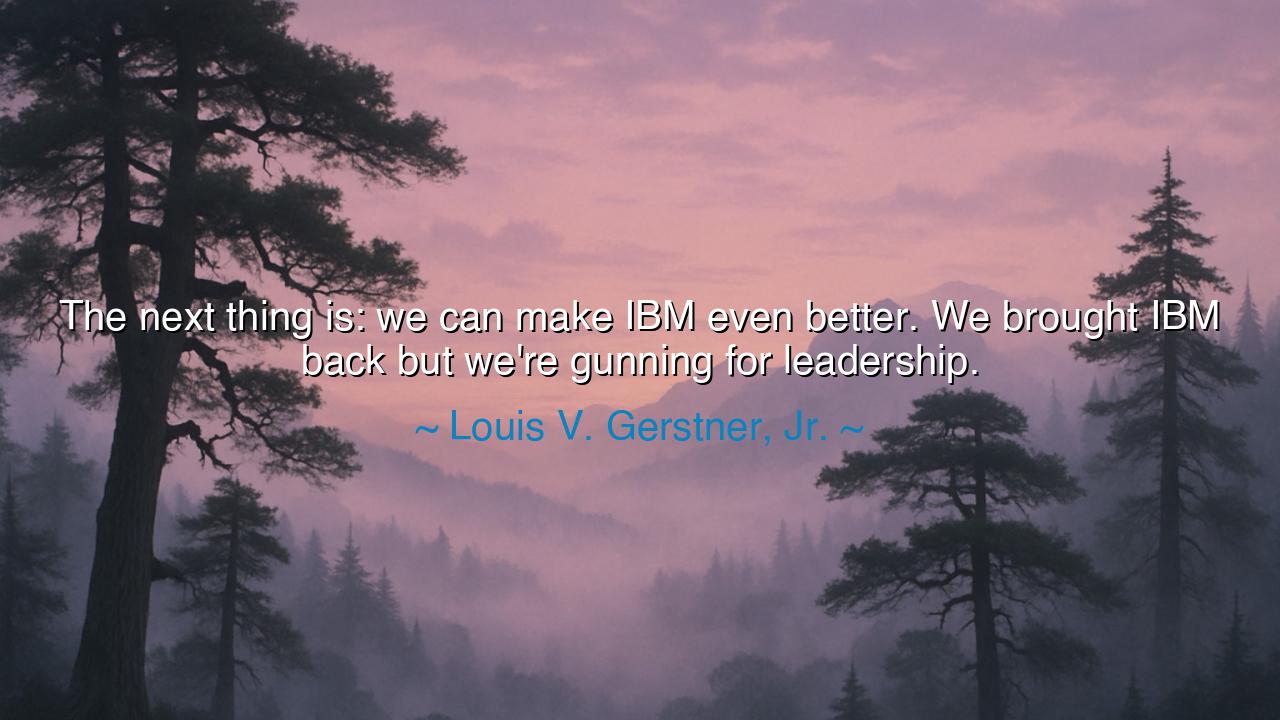
The next thing is: we can make IBM even better. We brought IBM
The next thing is: we can make IBM even better. We brought IBM back but we're gunning for leadership.






When Louis V. Gerstner, Jr. declared, “The next thing is: we can make IBM even better. We brought IBM back but we're gunning for leadership,” he spoke not merely of corporate triumph, but of renewal — the eternal rhythm of decline, recovery, and ascent that governs all human endeavor. Beneath his words lies a truth older than business itself: that survival is not enough. To live is one thing; to lead is another. The spirit that revives a fallen giant must never rest in the comfort of stability, for the flame that rekindles greatness can as easily fade if not fed by ambition.
Gerstner’s statement emerged in the crucible of the 1990s, when IBM, once the titan of technology, had fallen into crisis. Once the pride of American innovation, it faced financial ruin, burdened by bureaucracy and unable to adapt to the new age of computing. When Gerstner took the helm in 1993, he was not a typical technologist — he was a strategist, a realist, and a man who understood that institutions are not saved by formulas, but by vision. His leadership reversed the company’s collapse, transforming it from a relic of the past into a pioneer once more. Yet when he spoke of making IBM “even better,” he revealed that recovery was not the end of his journey. His eyes were fixed on the summit beyond — on leadership, not mere existence.
Such resolve is the mark of the ancient hero’s heart, the fire that refuses to grow complacent in victory. After all, the warrior who survives the battle must still conquer his own fatigue. History remembers Alexander the Great, who, after subduing the Persian Empire, wept that there were no more worlds to conquer — for in the heart of true greatness, rest feels like defeat. Gerstner’s vision echoes this same relentless drive: the belief that rebuilding is but the first step, and that true excellence lies in pushing beyond restoration, into the realm of mastery.
In this sense, his quote is not about a company, but about the human spirit. Every life, like every organization, faces moments of ruin — times when purpose seems lost and survival itself becomes a struggle. To bring oneself “back” from such darkness is noble, but it is only half the journey. The greater calling is to turn recovery into resurgence, to rise not only from failure, but above it, transformed and determined to lead where once we merely followed. To rebuild is to remember strength; to lead is to redefine destiny.
The ancient Stoics would have recognized the wisdom in Gerstner’s words. Marcus Aurelius, emperor and philosopher, wrote that the universe itself is a cycle of renewal — decay and creation intertwined. He urged his followers not to lament what is lost, but to use each fall as the ground from which to rise stronger. Likewise, Gerstner saw IBM’s collapse not as an ending, but as fertile soil for reinvention. His “gunning for leadership” was not an act of arrogance, but of faith — faith that discipline, creativity, and courage could turn failure into fuel. In this, he mirrored the timeless truth that adversity is the forge of greatness.
Consider too that his words speak to responsibility. For Gerstner, leadership was not about domination, but stewardship — about carrying forward the legacy of those who built before him, and ensuring that innovation remained in service of humanity. In the ancient world, the wise ruler sought not only conquest, but harmony — the balance between ambition and purpose. Gerstner’s vision of leadership carried this same sacred weight: to make something “even better” is not merely to elevate oneself, but to elevate all who depend upon the strength of your work.
And thus, the lesson for all who hear this quote is clear: do not stop at recovery. When life restores what was lost, do not rest; build again, higher and stronger. Whether in business, art, or the quiet struggles of the heart, remember that rebirth is not the end — it is the invitation to ascend. The ancients would say: the fire that survived the storm must now light the world. So too must we, like Gerstner, refuse to be content with survival. For greatness belongs not to those who return from the brink — but to those who, having returned, dare to lead once more.






AAdministratorAdministrator
Welcome, honored guests. Please leave a comment, we will respond soon